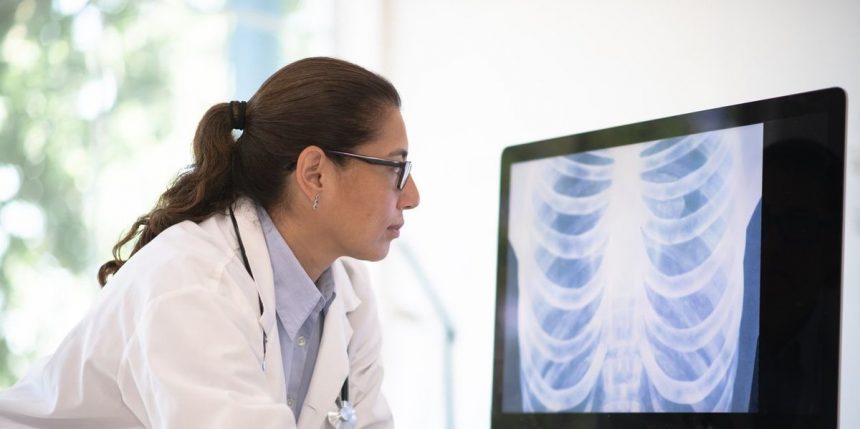
Sara Ghandehari, M.D., reviewed this document.
In the United States, lung cancer is a leading cause of death for individuals of all genders.
Lung cancer was previously perceived as a male smokers’ disorder, as men generally smoke more than women and smoking is the primary risk factor for lung cancer. However, research shows that women smokers have a higher likelihood of developing lung cancer, even with less exposure to cigarettes than male smokers, and the reason for this is still unknown.
Genetic and biological susceptibility are believed to play a significant role. Simply being a woman may increase your risk of developing lung cancer.
It is also important to understand that lung cancer rates are increasing among non-smokers.
Here we will discuss lung cancer screening guidelines, what they mean, and how you can better protect yourself.
What Are the Symptoms of Lung Cancer?
If you have lung cancer, you may experience:
- A persistent cough
- Coughing up blood
- Hoarseness
- Lack of appetite
- Unexplained weight loss
- Shortness of breath
- Fatigue
- Wheezing
- Recurring lung infections like pneumonia or bronchitis
These symptoms can also indicate other medical conditions, so experiencing them doesn’t necessarily mean you have lung cancer. But if you don’t feel well or have persistent symptoms, consult your healthcare provider for further evaluation.
What Are the Lung Cancer Screening Guidelines?
The U.S. Preventive Services Task Force (USPSTF) recommends screening if you meet all of the following criteria:
- You are between 50 and 80 years old
- You have a smoking history of 20 pack-years or more
- You are a current smoker or quit smoking 15 years ago or less
What is a pack-year? It’s a measure of how much someone has smoked over a period of time. To calculate your pack-year history, multiply the number of packs of cigarettes smoked per day by the number of years smoked. For example, smoking a pack a day for 20 years or two packs a day for 10 years equals 20 pack-years.
The American Cancer Society (ACS) recommends similar screening guidelines to the USPSTF but recently updated their guidelines to remove the 15-year requirement. According to the ACS, annual screenings are important regardless of how many years ago you quit smoking.
How Are Lung Cancer Screenings Done?
Previously, lung cancer screenings were done using chest X-rays, which capture an image of the bones and organs of the chest. However, research has shown that screenings using low-dose computed tomography (LDCT) scans are more effective.
An LDCT scan uses small amounts of radiation to capture detailed images of the chest using an X-ray machine. These images are taken in a spiral path around the body, which is why this procedure is also called spiral CT scanning.
The National Lung Screening Trial evaluated individuals aged 55 to 74 who had smoked a pack of cigarettes a day for at least 30 years. Participants were current smokers or had quit smoking 15 years ago or less. Researchers used chest X-rays or LDCT scans to detect lung cancer. They found that annual LDCT screenings for three years detected early-stage lung cancers better than chest X-rays. These screenings also reduced the risk of dying from lung cancer for smokers and heavy former smokers.
Should Non-Smokers Get Screened?
The Centers for Disease Control and Prevention (CDC) states that 1 in 5 people in the U.S. who have never smoked still develop lung cancer.
Despite this, the USPSTF only recommends lung cancer screenings for individuals at high risk: those aged 50 and older who smoke or have smoked. This is due to the potential risks of screenings, such as additional tests from false alarms, which may outweigh the minimal benefit of finding early-stage cancers for this group.
The American Cancer Society says there is not enough evidence to determine if screening tools could be beneficial for non-smokers. However, research and screening guidelines are constantly evolving.
Will Health Insurance Cover Lung Cancer Screenings?
In 2022, Medicare
expanded its coverage for screenings for individuals aged 50 to 77 with a smoking history of 20 pack-years who are current smokers or quit smoking 15 years ago or less. You should also not have any signs or symptoms of lung cancer.
Most private insurance plans and Medicaid expansion should also follow the new 2022 guidelines. Contact your individual insurance plan to see if you meet the criteria. You should not have to pay for any screenings if you meet the requirements, but your insurance may specify where you should go for the screenings.
This educational resource was prepared with the support of Merck.
From Your Site Articles
Related Articles Around the Web
. If the provided articles seems to be less than 200 characters or it is an intro of the author, then try to generate an articles using this title.Introduction to Lung Cancer Screenings





